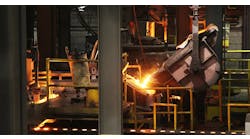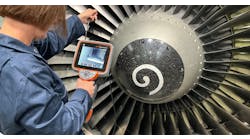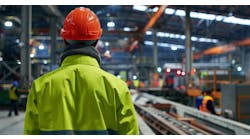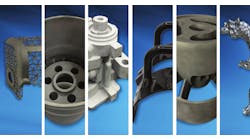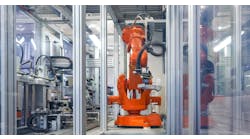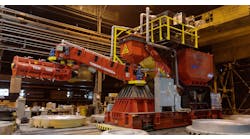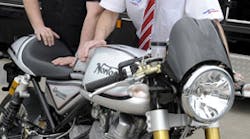Norton Motorcycle designer Simon Skinner and Alucast Ltd. managing director Tony Sartorius show off the Norton Commando 961 Cafe Racer, one of the re-launched brand’s models, for which the aluminum foundry casts critical engine components.
Alucast Limited is a nonferrous foundry in Wednesbury, England, that is doing its part to revive one that country’s cherished industrial brands — Norton Motorcycles. Being a specialist at casting a range of aluminum alloys and executing expert design techniques, Alucast has a contract to supply five critical engine parts to the current series of Norton cycles, including the rocker, sprocket, oil filter, and left and right side engine covers. As a result, it is contributing to the iconic appearance of the motorbikes and enhancing their performance — and the riders’ appreciation for their rides.
The $300,000 supply contract with Norton has been a highlight for Alucast this year, during which it has booked over $1.5 million in new business orders. Tony Sartorius, managing director at Alucast, also believes the contract is a real boost for manufacturing in Great Britain. “Norton is recognized the world over and we are delighted to be playing a small, but important part, in helping the new company re-establish the brand and ultimately to build unique motorcycles that are in demand all over the globe,” he said.
Alucast is a jobbing foundry formed in the late 1960s in England’s industrial West Midlands, a fitting location for a company serving as OEM’s one-stop manufacturing source for aluminum castings. Today, it is an operating unit of the MAN Group, which includes a range of manufacturing services covering mechanical, electrical, and electronic engineering activities.
The foundry’s operations include gravity casting; sand casting with green sand and air-set molding lines; and a series of fully automated high-pressure diecasting machines. All of Alucast’s products are manufactured within an approved, BS EN ISO-approved quality program, and the foundry also maintains preferred supplier status with many of it its customers.
Norton Motorcycle Co. is the current manifestation of a 113-year-old brand of motorbikes, famous for their wide use by Allied troops during World War II and for a various high-performance designs for civilian use in the decades after the War. However, labor issues and poor management unsettled the organization — though its products remained highly regarded — and the firm passed into foreign ownership in the 1990s. Efforts were made to preserve and consolidate the Norton designs, and in 2008 British interests bought the brand rights from some U.S. investors and re-launched Norton Motorcycle at Donning ton Park, also in the West Midlands.
“We were already supplying castings to the motorcycle industry, when a mutual contact arranged for us to meet with the people who had bought back Norton from the Americans in 2008,” Sartorius recalled. “They were determined that the motorbike would be reborn and that the UK supply chain would account for over 85% of its parts.”
He continued: “This was a big opportunity to get involved with this exciting project and we’ve spent a lot of time and investment in working with their design engineers to get the look and performance of the parts in keeping with the overall feel of the bike.
“It’s been a challenging project and stretched us in terms of innovation, design, process refinements, and as a tier one, management of our downstream supply chain.”
All of the parts are manufactured at Alucast’s gravity casting line and finish-machined in-house. Due to its exacting design requirements, Norton chose two local suppliers who specialize in high-end metal polishing to apply a finish that gives the castings their distinctive appearance.
“When Stuart Garner bought the company off the Americans in 2008, all we were left with was a small facility and a half-made bike in the corner,” detailed Simon Skinner, head of design at Norton Motorcycles. “I joined in February 2009 as the first employee, and we immediately set about re-engineering the bike and getting the brand back into the marketplace.
“We had to build a completely new supply chain and were adamant that every part, where possible, should be sourced from the U.K. This was once a great British manufacturing brand and we were determined to restore it back to its former glory.”
Skinner credited Alucast for its willingness to work with Norton to develop parts with exactness, adding, “their technical knowledge of castings was key to a number of design improvements being made and for the end products being competitively priced.
“I also like the fact that if there is an issue we can be at each other’s site in just over an hour, which, as a small company is great,” he continued. “We can’t afford to lose people for days on end while they travel the world sorting out problems.”
Norton is in the process of doubling operations at its site in Donning ton Park. Currently, it produces around 1,000 motorcycles per year across its Commando range, which includes the 961 SE, Cafe Racers, and Sport models. The demand for the hand-built motorbikes is huge, and the company reports advance orders of more than 3,000, so it plants to increase its manufacturing rate to 1,500/year by the end of 2011. If achieved, this will be met by more than doubling the existing workforce of 35.
Having gained full European type approval, Norton should also secure full vehicle-type approval in the U.S. this year, which will open up the worldwide market significantly.
“With over 85% of the motorbike made in the U.K., it is great news for British manufacturing that Norton is back and building world-class motorcycles,” Tony Sartorius concluded. “There is no doubt that the engineers at Norton are in the process of expanding their model range and I envisage further opportunities for us to cast additional products and maybe bring in other members of the MAN Group to play their part.”

